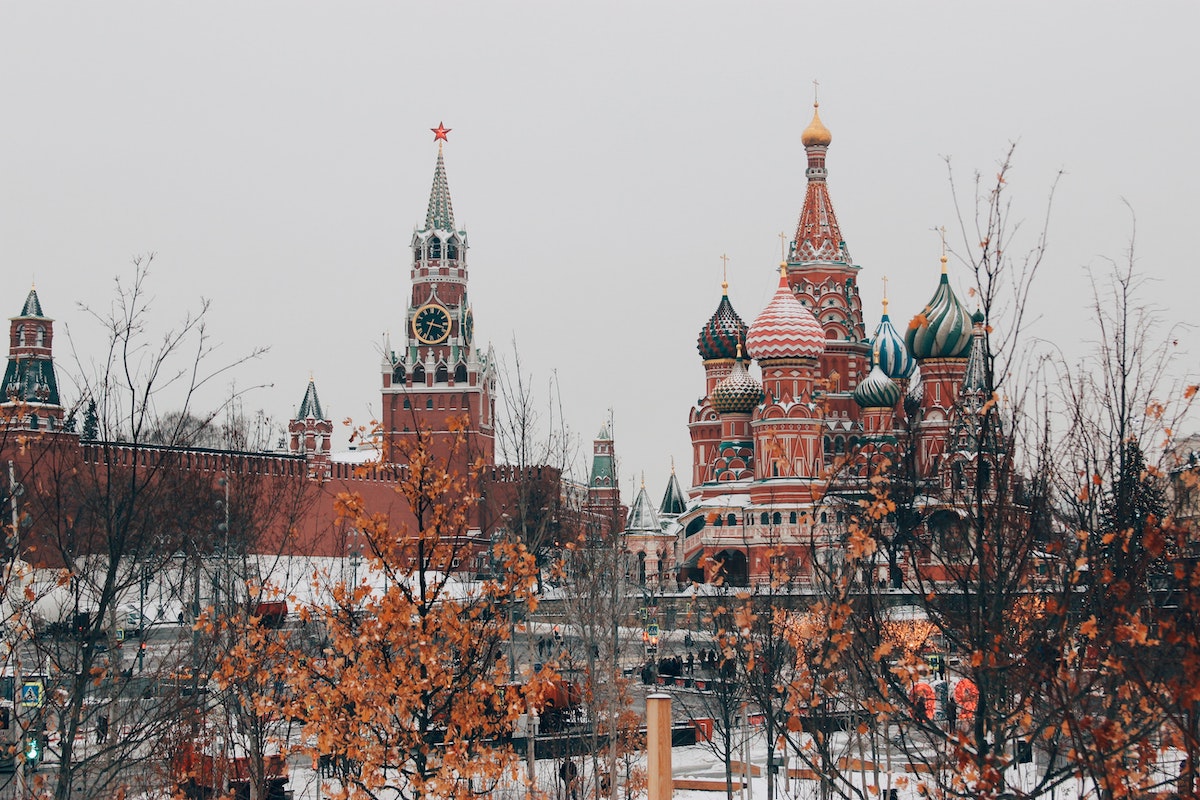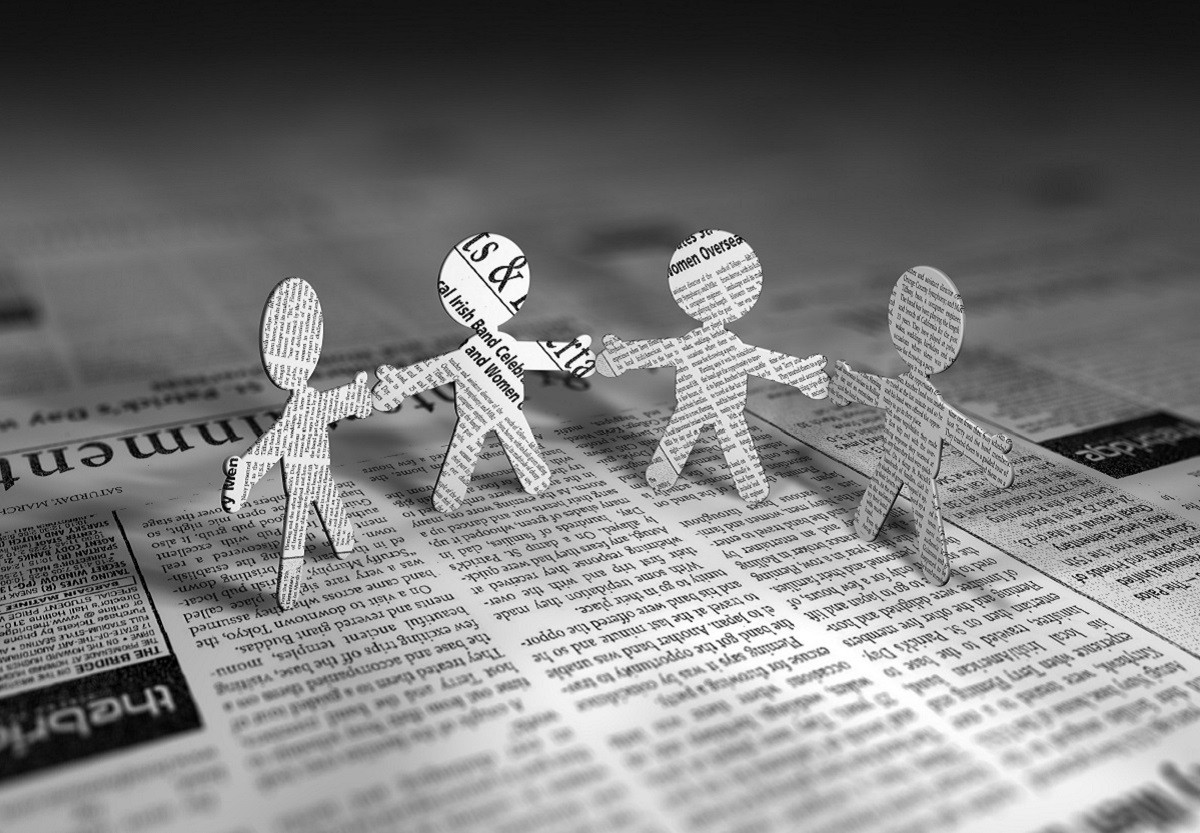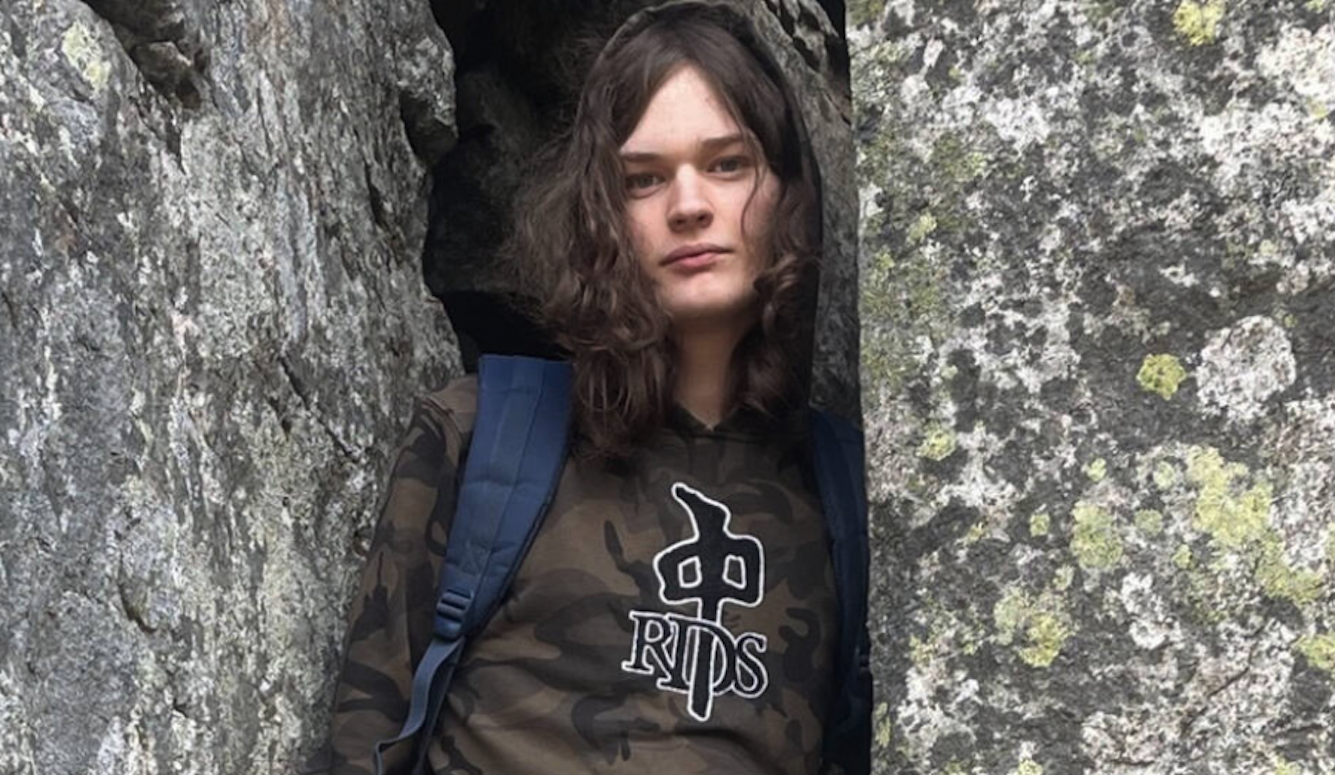COVID-19
The Battle for Russian Journalism
Opinion, he says, is not the same as activism and purely objective journalism does not exist.

Russia is a heavily authoritarian state, where the ruling class serves itself first and best. The country’s politics revolve almost entirely around the figure of Vladimir Putin, who has been the nation’s president (with one four-year break) since 2000. Closely researched books—such as Putin’s Kleptocracy by the late academic Karen Dawisha, and Putin’s People by the journalist Catherine Belton—convincingly expose his personal corruption and the culture of theft among his closest associates. These people see themselves, in Belton’s phrase, as “anointed custodians,” and have decided that their mission to restore at least part of the empire of which Russia was shorn by the break-up of the USSR entitles them to great power and rewards.
Nevertheless, Putin’s Russia is not Xi Jinping’s China nor Abdel Fattah el-Sisi’s Egypt—there does exist some space for civil society. It is more like an upscaled nuclear-armed version of Viktor Orbán’s Hungary. An opposition exists, but it cannot win. The leader may be criticised, but not replaced (except, in Putin’s case, when he arranges it as a manoeuvre to extend his reign). Protests are frequent, and sometimes large, but the system absorbs them and remains intact. One of the most important challenges to the current Russian system can be found in its journalism. The main news media are controlled, but they now face competition and opposition from an exceptionally lively and growing cadre of mostly young journalists, many of whom have prior experience of working within state media. They make effective use of the techniques of investigative journalism, and are attracting a growing audience at a time when the controlled media’s coverage of the pandemic is increasingly suspect.
This is by no means a risk-free pursuit. Journalists in Russia are sometimes killed for their coverage of corruption, law-breaking by authorities, mafia involvement in governance, and suppression of civil and human rights. This has been the case for decades, especially in the Russian Caucasus and the Far East. In Moscow, however, which has by far the largest community of journalists, their collective power to resist government or police intimidation of their profession is much greater. The most remarkable example came a year ago, when the arrest and beating of one of the country’s best known investigative reporters, Ivan Golunov produced a burst of public outrage. In the New Yorker, Masha Gessen, an outstanding Russian journalist now living in the US, wrote: “Moscow law enforcement recently spent 56 hours torturing a man. Almost immediately, Moscow reporters mobilized to obtain and disseminate information about his arrest and detention, and, once they did, their audiences were able to observe the situation almost in real time.”
Golunov was forcibly searched, a package of drugs of which he says he had no knowledge was discovered in his knapsack, he was dragged along the floor, and hit in the face. When a doctor was allowed to examine him two days later, he was found to have suffered concussion and broken ribs. These details were made public by MediaZona, a website which had managed to obtain the official report on Golunov’s arrest. Meduza, another investigative website founded in the Latvian capital of Riga in 2014, also released a statement asserting Golunov’s innocence. Golunov had worked for the site on investigations into the connections between the Federal Security Service (FSB) and corruption in Moscow’s city government.
MediaZona subsequently urged journalists to rally in Golunov’s defence under the headline “They Have Come for Us.” They were even joined by colleagues from private and public media usually controlled by the state. Three leading dailies—Kommersant, Vedomosti, and RBK—splashed huge headlines across their front pages declaring “I AM/WE ARE IVAN GOLUNOV,” and the next day he was cleared of all charges and released. A human rights activist named Oyub Titiev, arrested in 2018, was also released. Six months later, five ex-police officers were charged with fabrication of evidence. This was a departure from the norm: Very few arrests have been made in connection with the many murders and assaults on journalists in the past three decades, and even fewer convictions have been obtained.
The creators in this exciting new media ecosystem are a mixture: Some are unambiguously opposed to the current regime and routinely smudge the line between journalism and activism during the course of their campaigning. Others are trying to fulfil journalism’s traditional fact-finding role and tell the truth in a country where perceptions are often bent to suit the preferred narrative of the powerful. These journalists are usually aged between 20 and 40, along with a few older hands who have been in the game longer, and they are a testimony to a spirit in Russia which, 30 years after the collapse of the Soviet Union, is still learning what a democratic civil society should look like. No other major authoritarian state permits a journalism as lively or robust and heterodox in its views. This allows the creation of platforms for voices and opinions hitherto marginalised or censored by state media, and ensures that at least some of the facts inconvenient to Putin’s regime are reported.
* * *
Television is by far the most popular news medium in Russia and it is one of the few institutions capable of connecting people across the country’s vast landmass. However, its channels, especially the most-watched Channel One, are almost wholly controlled. And while Russia’s world service RT (Russia Today) occasionally shows incisive documentaries, like its domestic equivalents, it also routinely broadcasts political discussion programmes in which the prevailing Kremlin line, no matter how fanciful it may be, is faithfully relayed. During the international outcries provoked by the downing of a Malaysian airliner over Ukraine in July 2014, and the attempted murder of the former spy Sergei Skripal in Salisbury in March 2018, RT uncritically disseminated Russian state propaganda by rote. Newspapers, which can carry some criticism, are largely confined in circulation to the main cities in European Russia. The only overtly and consistently critical daily, Novaya Gazeta, struggles to stay alive.
The behaviour of the state-controlled news media during the coronavirus crisis has shown how deeply irresponsible journalism can be when it is constrained by the need to serve political power. Like Donald Trump and Brazilian President Jair Bolsonaro, Putin was initially exceedingly reluctant to acknowledge the danger the pandemic posed to his country or his citizens, and the state-controlled media obediently followed his lead. On March 11th, the day the World Health Organisation declared the COVID-19 outbreak a pandemic, Channel One’s head of news Kirill Kleimyonov urged Russians to vote in an April 22nd referendum. The clear—if not exactly explicit—message was that Russians should approve amendments to the Russian constitution allowing Putin to remain in office beyond 2024. No mention was made of coronavirus or the dangers posed by exposure to infection.
But, inevitably, the constitutional imperative had to bow before fears about the uncontrolled spread of the virus, and gathering alarm about the inadequacy of Russia’s hospitals. A study by the Russian Audit Chamber published in February found that 41 percent of Russian hospitals have no central heating and 31 percent have no adequate plumbing. Finally forced to confront the unfolding global emergency, Putin knew better than to visit one of these dismal facilities. Instead, on March 24th, he climbed into a yellow protective suit and toured the prestigious Kommunarka hospital in Moscow, which had been turned into the main receiving centre for coronavirus patients.
The following day, in an attempt to reassert control, Putin declared that the constitutional referendum would be delayed, and announced the first series of emergency measures, including a stay-at-home order. Fines would be handed out and “dissidents” would be arrested and even threatened with charges of “terrorism.” Consistent with this new line, Kleimyonov now began railing at anyone who failed to comply with these directives. The stage-managed visit to the Kommunarka centre was not, however, a public relations success. It subsequently emerged that the chief physician Denis Protsenko was infected with the virus, and since Putin had shaken his hand, the president was forced to self-isolate in his dacha at Novo-Ogaryovo. There he remained until May 9th, broadcasting messages to the Russian people on no less than five occasions. In spite (or maybe because) of that, his approval ratings dropped to what for him is a low level of 59 percent.

Despite the introduction of measures designed to mitigate the spread of COVID-19, preparations for the 75th annual Victory Day celebrations on May 9th went ahead as usual, halted only in mid-April. In Russia, remembering the surrender of Germany in 1945 has attained the emotional heft of a supreme religious and nationalist rite—and no wonder, since an estimated 27 million Soviet lives were lost, directly and indirectly, during just four years of war, far more than in any other combatant state, including Germany. It is now thought that hundreds of those working on the Victory Day preparations contracted the virus, only to learn that, like the constitutional referendum, the parade had been indefinitely postponed on the reluctant order of the president. By the second half of May, Russia recorded one of the highest rates of pandemic infection in the world.
As the novel coronavirus was spreading silently through the country, the state-controlled media did little to inform its viewers about the risks and hazards it posed. The main news programme, Vremya (“Time”) did report on issues relating to the pandemic and lockdown, but much of that airtime was devoted to mocking responses to the pandemic in the US, Europe, and Ukraine (official Russian figures still show a death rate much lower than in the UK, France, and Spain). And while the horrors visited on the West were given copious and gloating attention, little was done to explain the nature of the disease or why the reported fatality rate in Russia was so much lower than elsewhere. Alexei Navalny, the much-imprisoned leader of Russia’s unofficial opposition, maintains a YouTube channel that attracts millions, and he did launch a “Five Steps for Russia” campaign demanding more resources to fight COVID-19. However, its main aim was to highlight the incompetence of the Putin regime, which left Russians with little idea of whom to trust.
State media’s abdication of journalistic responsibility during the pandemic created a vacuum which young independent reporters now aspire to fill, and they seem to have secured the trust of a significant following over the past few months. In 2019, former TV presenter Alexey Pivovarov brought together a group of them, and every week they report new developments and emerging information from his YouTube channel, which has already amassed more than a million subscribers. The group’s most recent videos have examined Russia’s attempts to fight COVID-19, as well as related issues faced by the country, such as the strain suffered by its healthcare system and economy, and have drawn more than a million views each.
On her “Let’s Talk” show, former television journalist Irina Shikhman reported on the problems faced by Russian doctors and their fear of criticising the government’s often inept efforts to deliver equipment needed to fight the pandemic. Her video drew over 3.5 million views. The Russian public, like publics everywhere, would like to trust its state health service, and many who work within it have shown the same courage and devotion to their exacting calling as healthcare professionals in other struggling nations. But the medical professionals are understandably nervous about discussing the problems they encounter—the head of an independent doctors’ union, Anastasia Vasilieva, who has called the state’s low fatality figures “lies,” was arrested in early April and detained overnight while driving from Moscow to a rural town to deliver masks, gloves, and other necessary supplies.
In another instance, an ambulance employee at the Abinsky District Hospital in Krasnodar Krai was warned that he and his colleagues could face criminal or administrative charges after they lodged a collective complaint about the lack of hazard pay when working with coronavirus patients. Especially in the capital, the pressure on hospitals was vividly displayed by lines of ambulances carrying sick patients awaiting admittance, some of which were reportedly kept there for as long as 15 hours. Russian doctors appear on state television quite frequently, and they are permitted to talk about general challenges, such as the undeniable surge of sick patients. However, with very few exceptions, they rarely complain publicly about the shortage of face masks or other items of personal protective equipment, despite the fact that even Moscow does not have enough PPE and the country is suffering from a nationwide shortage of working ventilators. Some doctors will talk to the independent media about such problems, but most insist on anonymity when they do so.
* * *
Russian TV did not report the spike in infections (and possible deaths) suffered by those preparing the aborted Victory Day celebrations; that was covered by a new independent reporting website named Proekt, which had been established by a group of experienced but frustrated reporters just in time to play a critical role in explaining the pandemic to the Russian public. Another new site, The Bell, offers general and business coverage and sharply critical commentary in a twice-daily email format. But as these sites and their journalists are growing into their vital roles as a check on regime power and propaganda, they are having to grapple with a dilemma familiar to reporters in countries with relatively free media—that is, distinguishing between activism on the one hand and neutral-if-sceptical hard reporting on the other.
Alexander Gorbachev (no relation of the former president of the Soviet Union), formerly a deputy editor at Meduza, argues that politically committed reporting risks becoming entangled in political advocacy and activism, with journalists seeking to impose their views on the reader at the expense of truth and accuracy. Tikhon Dzyadko, editor of Dozhd (“TV Rain”), the only independent television channel in Russia, disagrees, arguing that journalists who pretend they are morally indifferent to political matters are simply not being honest. Opinion, he says, is not the same as activism and purely objective journalism does not exist.
This disagreement shows how rapidly Russian journalism is attempting to move beyond the reach of the state and develop its own codes of ethics. It resembles the clash between Bill Keller, formerly executive editor of the New York Times (2003 – 11), and radical columnist Glenn Greenwald, to whom former NSA contractor Edward Snowden leaked over a million classified files in 2013. Later that same year, Keller and Greenwald set out their conflicting views of journalism during a lengthy exchange of letters in the New York Times. Greenwald declared objectivity to be “a suffocating constraint on how reporters are permitted to express themselves, [which] produces a self-neutering form of journalism that becomes as ineffectual as it is boring.” Keller replied: “I believe that impartiality is a worthwhile aspiration in journalism, even if it is not perfectly achieved… in most cases it gets you closer to the truth because it imposes a discipline of testing all of your assumptions, very much including your own.”
Yet while these debates are ongoing, the Russian state is attempting to wrest back control of the flow of information. The latest high profile battle in the struggle for Russian journalism involves Vedomosti (“Gazette”) a political and business daily founded in September 1999 as a joint venture by the Wall Street Journal, the Financial Times, and the (then) publisher of the Moscow Times. Its first editorial proclaimed that, “A journalist must treat all events, firms, and people with equal scepticism. Nobody is entitled to special treatment—least of all the shareholders, advertisers, and the so-called oligarchs.” And, during the first twenty-plus years of its existence, the paper by and large remained admirably faithful to this bold mission. But over the years, its very success as a venture of clear and well-sourced journalism resulted in increasing constraints. Its foreign ownership was banned, it acquired new owners, and in March of this year it was announced that Vedomosti would be sold to an investment company and a tabloid publisher.
A new editor, Andrei Shmarov, was appointed and immediately told staff that he was unconcerned by changes demanded by the new owners. He went on to criticise some of his own columnists, alter a negative headline above a story about Russia’s largest state-owned oil company Rosneft, spike a column about its CEO Igor Sechin who is close to Putin, and announce that he would not publish any criticism of the constitutional amendments intended to prolong Putin’s presidency. Nor would he allow any mention of the independent pollster Levada-Center, which had been the first to publish Putin’s approval rating tumble to 59 percent. The staff protested and attempted to republish the deleted column on Rosneft twice without success (it was later published by other media). On May 29th, the newspaper was officially passed to its new owners—who, it later emerged, appear to have strong links to Rosneft.
The Russian mediascape is now a complicated and rapidly evolving battleground, in which powerful establishment forces try to neuter small sceptical outlets like Vedomosti and a nascent independent journalism scene tries to figure out how best to make use of the freedom it is carving out for itself in a hostile and occasionally dangerous environment. But this battle is just getting started, and the outcome is by no means certain. One of the great journalistic conflicts of our time is joined. It deserves our attention.
Alexandra Vladimirova is a Russian freelance journalist based in Moscow and former journalist fellow at the Reuters Institute for the Study of Journalism.
John Lloyd is a contributing editor to the Financial Times and co-founder of the Reuters Institute for the Study of Journalism at the University of Oxford. His latest book is Should Auld Acquaintance Be Forgot: The Great Mistake of Scottish Independence (Polity Press).






